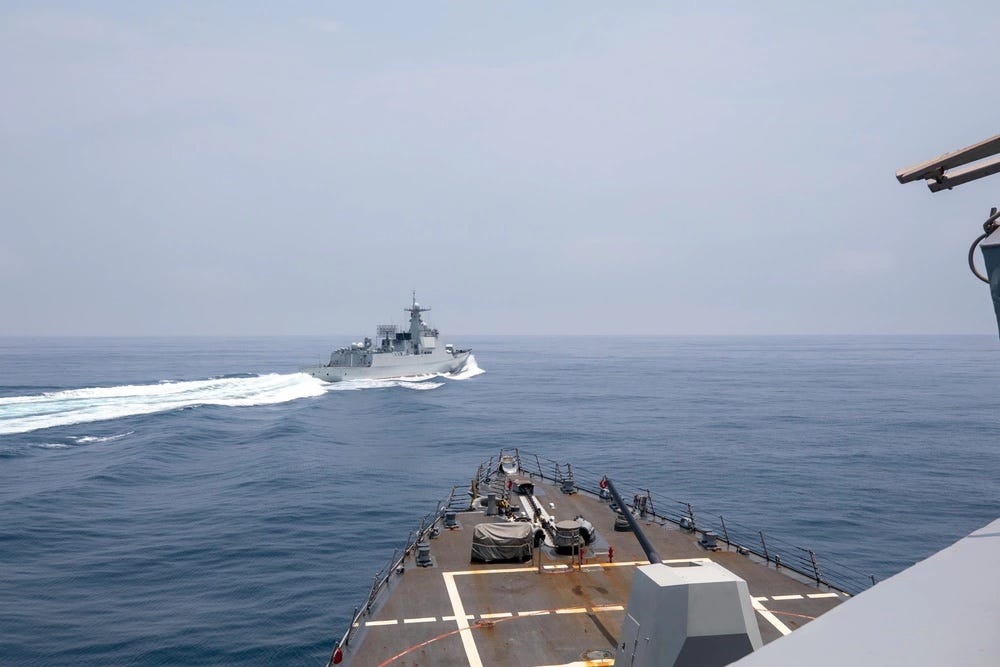As tensions build between China and Taiwan, the U.S. must maintain the status quo at all costs
The following was originally published on August 14, 2023 in Chicago Tribune.
Photo: DVIDS
Taiwan recently conducted the first-ever “anti-takeover drill” at the island’s main Taoyuan International Airport, reflecting the growing fears that China will soon launch an all-out war to seize Taiwan.
Unsurprisingly, China responded by sending 29 ships and planes on missions near Taiwan. Because the risks to the U.S. of getting drawn into such a conflict are high, President Joe Biden’s administration should begin immediately to reassess its regional policies to ensure America’s vital national interests are not unnecessarily harmed. The risks of such a clash are real and appear to be on the rise.
These events were preceded by 11 Chinese fighter planes crossing the median line between Taiwan and mainland China. These planes did something they had never done before: They flew up to the very edge of Taiwanese airspace, 12 miles off the coast. Last month, a record 16 Chinese warships sailed close to the Taiwanese coast. These are recent examples of escalating Chinese military actions that spiked after August 2022 when then-Speaker of the House Nancy Pelosi made an official visit to Taiwan.
Following that visit, China launched an impromptu five-day military exercise that featured 100 military aircraft, a large number of warships and multiple live missile tests in the waters on all sides of Taiwan. The exercise effectively simulated the opening rounds of an invasion of Taiwan. Meanwhile, Taiwan and the United States remain undeterred, both politically and militarily.
Last April, current House Speaker Kevin McCarthy met in California with Taiwanese President Tsai Ing-wen, predictably angering Beijing. This month, Taiwanese Vice President and 2024 presidential candidate William Lai Ching-te plans to visit the United States. China said it would seek to prevent the visit. Secretary of State Antony Blinken visited several countries in the Indo-Pacific last month in an effort to rally nations into supporting American policies, while Secretary of Defense Lloyd Austin visited the strategically situated island nation of Papua New Guinea to shore up basing rights.
For its part, China continues not only conducting aggressive air and sea exercises in and around Taiwan but also expanding its ability to project power throughout the South China Sea area. It is expanding and modernizing its arsenal of nuclear missiles, and it continues to expand its already-large fleet of warships. According to a report recently released by the Middlebury Institute of International Studies, China has been producing a large number of DF-17 and DF-26 medium- and long-range missiles that would allow them to attack U.S. naval vessels and air bases as far away as Guam.
Meanwhile, communication between the U.S. and Chinese militaries is virtually nonexistent at the highest levels. That is especially concerning in light of the recent spate of near collisions between U.S. and Chinese ships and planes. At the moment, tensions continue to ratchet up between Beijing and Washington, with both sides wanting to appear tough to deter the other from taking military action. The result, however, is making war more likely, not less. The United States must do something to lower tensions to maintain the peace in the Indo-Pacific while also retaining the ability to defend our interests.
Since 1971, U.S. policy toward China and Taiwan has been embodied in the “one China” principle. This intentionally ambiguous policy states that the U.S. will publicly recognize there is only one China and declare that we recognize Beijing as the rightful government of China—but refuse to acknowledge Chinese claims of control over Taiwan. Via the 1979 Taiwan Relations Act, we agreed to “make available to Taiwan such defense articles and defense services in such quantity as may be necessary to enable Taiwan to maintain a sufficient self-defense capacity.”
For the last half century, the status quo among the United States, Taiwan and China has preserved the peace, safeguarded Taiwan’s freedom and ability to flourish as a sovereign polity, and prevented periodic crises from exploding into open warfare. That status quo is the best guarantor of continued peace and prosperity in the Indo-Pacific, and Washington should do whatever it takes to ensure it continues into the indefinite future.
The U.S.-China bilateral relationship may be the most important in the world, as the two nations’ economies and militaries are globally dominant. Last year, despite a considerable deterioration in the relationship, the trade between the two nations reached $690 billion, an all-time record. A war in the Taiwan Straits would be the worst possible outcome for the United States, Taiwan, China and the global economy. It must, therefore, be avoided at all costs.
It is important that Washington do all it can to protect our economic interests from Chinese espionage and our national security from any Chinese attacks. Robust competition with China is appropriate and necessary. Armed conflict is not. Maintaining the status quo indefinitely is the best path to securing American economic and military interests.




